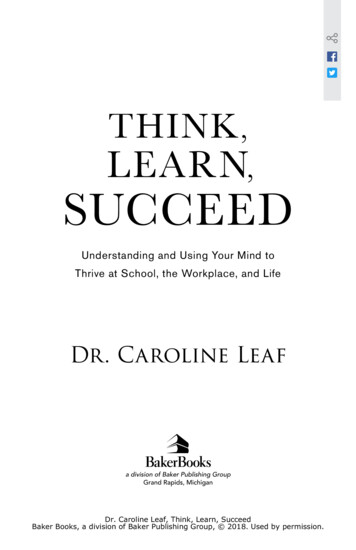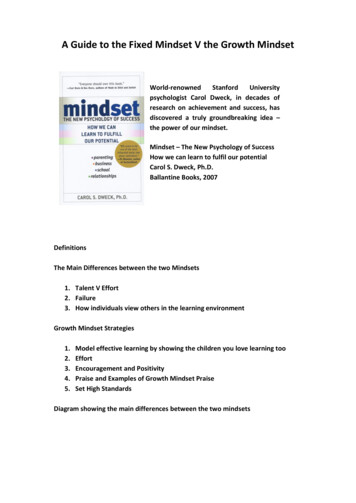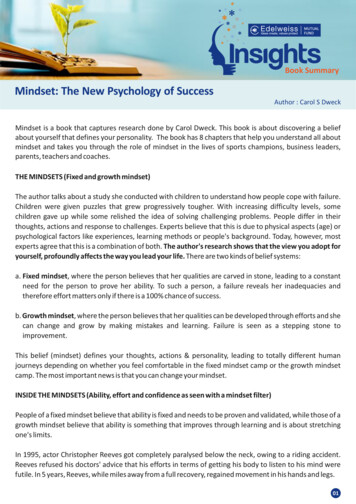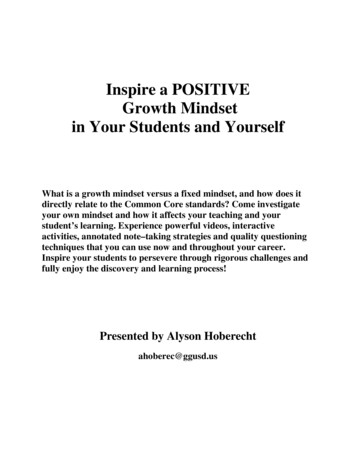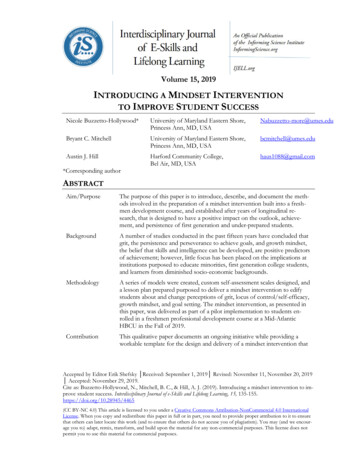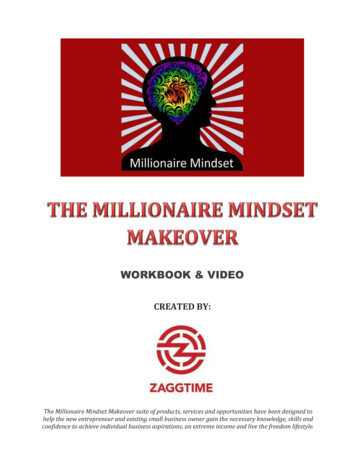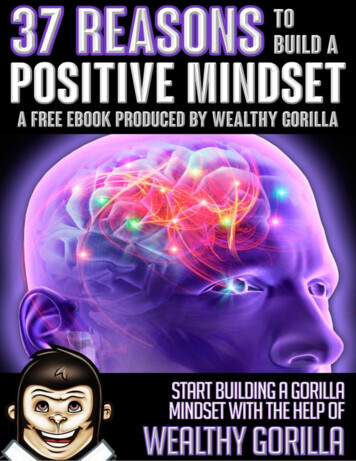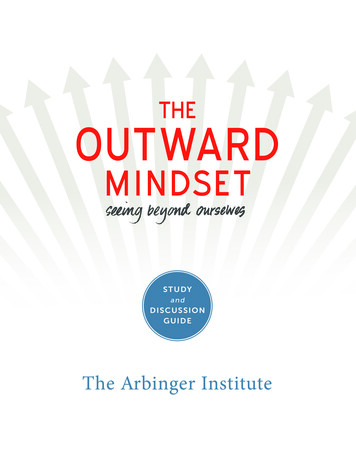
Transcription
February 2012Career &Self- DevelopmentSOUNDVIEWMindsetThe New Psychology of SuccessTHE SUMMARY IN BRIEFEvery so often a truly groundbreaking idea comes along. World-renownedStanford University psychologist Carol Dweck, in decades of research on achievement and success, has discovered a truly profound idea — the power of our mindset.Dweck has found that everyone has one of two basic mindsets. If you havethe fixed mindset, you believe that your talents and abilities are set in stone —either you have them or you don’t. You must prove yourself over and over, trying to look smart and talented at all costs. This is the path of stagnation, and itoften leads to frustration and a lack of achievement.If you have a growth mindset, however, you know that talents can be developed and that great abilities are built over time. This is the path of opportunityand success. Dweck reveals how creative geniuses in all fields — music, literature,science, sports, business — apply the growth mindset to achieve results. She provides a practical method to allow us to fulfill our own potential.In Mindset: The New Psychology of Success, Dweck makes clear why praisingintelligence and ability doesn’t foster self-esteem or lead to accomplishment, butmay actually jeopardize success. With the right mindset, we can motivate othersand help them improve, as well as reach our own goals — personal and professional. Dweck reveals what all great CEOs, parents, teachers and athletes alreadyknow, and shows how a simple idea about the brain can create a love of learningand a resilience that is the basis of great accomplishment in every area.IN THIS SUMMARY, YOU WILL LEARN: Why brains and talent don’t bring success.How brains and talent can stand in the way of success.Why praising brains and talent doesn’t foster self-esteem.How teaching a simple idea about the brain raises productivity.How a change of mind is always possible.by Carol S. Dweck, Ph.D.CONTENTSThe MindsetsPage 2Inside the MindsetsPage 3The Truth About Abilityand AccomplishmentPage 4Sports: The Mindset ofa ChampionPage 4Business: Mindsetand LeadershipPage 5Relationships: Mindsetsin Love (or Not)Page 6Parents, Teachers andCoaches:Where Do MindsetsCome From?Page 6Published by Soundview Executive Book Summaries , 500 Old Forge Lane, Suite 501, Kennett Square, PA 19348 USA 2012 Soundview Executive Book Summaries All rights reserved. Reproduction in whole or part is prohibited.Concentrated Knowledge for the Busy Executive www.summary.com February 2012 Order #34E-TFSChanging Mindsets:A WorkshopPage 7
THE COMPLETE SUMMARY: MINDSETby Carol S. Dweck, Ph.D.The author: Carol S. Dweck, Ph.D., is a leading researcher in the field of motivation and is the Lewis and Virginia EatonProfessor of Psychology at Stanford. Her research focuses on why people succeed and how to foster their success. She haslectured to business, education, and sports groups all over the world and has been elected to the American Academy of Artsand Sciences. Her work has been prominently featured in such publications as The New Yorker, Newsweek, Time, The NewYork Times, and The Wall Street Journal. Mindset has been widely acclaimed and translated into 19 languages.From the book MINDSET by Carol Dweck. Copyright 2006 by Carol S. Dweck, Ph.D. Published by arrangement with RandomHouse, an imprint of The Random House Publishing Group, a division of Random House, Inc. 16.00, 246 pages, ISBN: 978-0-345-47232-8. To purchase this book, go to www.amazon.com or www.bn.com.Summary copyright 2012 by Soundview Executive Book Summaries www.summary.com, 1-800-SUMMARY.For additional information on the author, go to www.summary.com.IntroductionOne day, my students sat me down and ordered me towrite this book. They wanted people to be able to useour work to make their lives better. It was somethingI’d wanted to do for a long time, but it became myNo. 1 priority.My work is part of a tradition in psychology thatshows the power of people’s beliefs. These may bebeliefs we’re aware of or unaware of, but they stronglyaffect what we want and whether we succeed in gettingit. This tradition also shows how changing people’sbeliefs — even the simplest beliefs — can haveprofound effects.In this book, you’ll learn how a simple belief aboutyourself — a belief we discovered in our research —guides a large part of your life. In fact, it permeates everypart of your life. Much of what you think of as yourpersonality actually grows out of this “mindset.” Muchof what may be preventing you from fulfilling yourpotential grows out of it. lThe MindsetsFor 20 years, my research has shown that the viewyou adopt for yourself profoundly affects the way youlive your life. It can determine whether you become theperson you want to be and whether you accomplish thethings you value. How does this happen? How can asimple belief have the power to transform your psychology and, as a result, your life?Believing that your qualities are carved in stone — thefixed mindset — creates an urgency to prove yourself1-800-SUMMARYover and over. If you have only a certain amount ofintelligence, a certain personality and a certain moralcharacter — well, then you’d better prove that you havea healthy dose of them. It simply wouldn’t do to look orfeel deficient in these most basic characteristics.Some of us are trained in this mindset from an earlyage. Even as a child, I was focused on being smart, butthe fixed mindset was really stamped in by Mrs. Wilson,my sixth-grade teacher. She believed that people’s IQscores told the whole story of who they were. We wereseated around the room in IQ order, and only the highest-IQ students could be trusted to carry the flag, clapthe erasers or take a note to the principal. Aside fromthe daily stomachaches she provoked with her judgmental stance, she was creating a mindset in which everyonein the class had one consuming goal — look smart,don’t look dumb. Who cared about or enjoyed learningwhen our whole being was at stake every time she gaveus a test or called on us in class?I’ve seen many people with this one consuming goalof proving themselves — in the classroom, in theircareers and in their relationships. Every situation calls fora confirmation of their intelligence, personality or character. Every situation is evaluated: Will I succeed or fail?Will I look smart or dumb? Will I be accepted or rejected?Will I feel like a winner or a loser?But doesn’t our society value intelligence, personalityand character? Isn’t it normal to want these traits?Yes, but .There’s another mindset in which these traits are notsimply a hand you’re dealt and have to live with, alwaystrying to convince yourself and others that you have aPublished by Soundview Executive Book Summaries (ISSN 0747-2196), 500 Old Forge Lane, Suite 501, Kennett Square,PA 19348 USA, a division of Concentrated Knowledge Corp. Published monthly. Subscriptions starting at 99 per year.service@summary.com Copyright 2012 by Soundview Executive Book Summaries .Available formats: Summaries are available in several digital formats. To subscribe, call us at 1-800-SUMMARY (240-912-7513 outside the United States), or order onlineat www.summary.com. Multiple-subscription discounts and corporate site licenses are also available.Rebecca S. Clement, Publisher; Sarah T. Dayton, Editor In Chief; Andrew Clancy, Senior Editor; Amanda Langen, Graphic Designer; Chris Lauer, Contributing Editor2 Soundview Executive Book Summaries www.summary.com
Summary: MINDSETroyal flush when you’re secretly worried it’s a pair of 10s.In this mindset, the hand you’re dealt is just the startingpoint for development. This growth mindset is based onthe belief that your basic qualities are things you can cultivate through your efforts. Although people may differin every which way — in their initial talents and aptitudes, interests or temperaments — everyone can changeand grow through application and experience.Do people with this mindset believe that anyone canbe anything, that anyone with proper motivation or education can become Einstein or Beethoven? No, but theybelieve that a person’s true potential is unknown (andunknowable); that it’s impossible to foresee what can beaccomplished with years of passion, toil and training.The Growth MindsetDid you know that Darwin and Tolstoy were considered ordinary children? That Ben Hogan, one of thegreatest golfers of all time, was completely uncoordinatedand graceless as a child? That the photographer CindySherman, who has been on virtually every list of the mostimportant artists of the 20th century, failed her first photography course? That Geraldine Page, one of our greatestactresses, was advised to give up for lack of talent?You can see how the belief that cherished qualities canbe developed creates a passion for learning. The passionfor stretching yourself and sticking to it, even (or especially) when it’s not going well, is the hallmark of thegrowth mindset. This is the mindset that allows peopleto thrive during some of the most challenging times intheir lives. lInside the MindsetsWhen I was a young woman, I wanted a glamorouscareer, but nothing too hard or risky. And I wanted it allto come to me as validation of who I was.It would be many years before I was satisfied. I have agreat career, but boy, is it a constant challenge. Nothingwas easy. So why am I satisfied? I changed my mindset.I changed it because of my work. One day my doctoral student, Mary Bandura, and I were trying tounderstand why some students were so caught up inproving their ability, while others could just let go andlearn. Suddenly we realized that there were two meanings to ability, not one: a fixed ability that needs to beproven, and a changeable ability that can be developedthrough learning.That’s how the mindsets were born. I knew instantlywhich one I had. I realized why I’d always been so concerned about mistakes and failures. And I recognized forthe first time that I had a choice.Enter a New WorldWhen you enter a mindset, you enter a new world. Inone world — the world of fixed traits — success isabout proving you’re smart or talented; validating yourself. In the other — the world of changing qualities —it’s about stretching yourself to learn something new;developing yourself.In one world, failure is about having a setback.Getting a bad grade. Losing a tournament. Getting fired.Getting rejected. It means you’re not smart or talented.In the other world, failure is about not growing. Notreaching for the things you value. It means you’re notfulfilling your potential.In one world, effort is a bad thing. It, like failure,means you’re not smart or talented. If you were, youwouldn’t need effort. In the other world, effort is whatmakes you smart or talented.You have a choice. Mindsets are just beliefs. They’repowerful beliefs, but they’re just something in yourmind, and you can change your mind. As you read,think about where you’d like to go and which mindsetwill take you there.Mindsets Change the Meaning of EffortAuthor and The New Yorker writer Malcolm Gladwellhas suggested that, as a society, we value natural, effortless accomplishment over achievement through effort.We endow our heroes with superhuman abilities that ledthem inevitably toward greatness. It’s as if Midoripopped out of the womb fiddling, Michael Jordan dribbling and Picasso doodling. This captures the fixedmindset perfectly, and it’s everywhere.A report from researchers at Duke University soundsan alarm about the anxiety and depression among femaleundergraduates who aspire to “effortless perfection.”They believe they should display perfect beauty, perfectwomanhood and perfect scholarship all without trying(or at least without appearing to try).Americans aren’t the only people who disdain effort.French executive Pierre Chevalier says, “We are not anation of effort. After all, if you have savoir-faire, you dothings effortlessly.”People with the growth mindset, however, believesomething very different. For them, even geniuses haveto work hard for their achievements. And what’s soheroic, they would say, about having a gift? They mayappreciate endowment, but they admire effort, for nomatter what your ability is, effort is what ignites thatability and turns it into accomplishment. lwww.summary.com Soundview Executive Book Summaries 3
Summary: MINDSETThe Truth About Abilityand AccomplishmentSports: The Mindset ofa ChampionThomas Edison was no naïve tinkerer or unworldlyegghead. The “Wizard of Menlo Park” was a savvyentrepreneur, fully aware of the commercial potential ofhis inventions. He also knew how to cozy up to thepress — sometimes beating others out as the inventor ofsomething because he knew how to publicize himself.Yes, he was a genius. But he was not always one. Hisbiographer, Paul Israel, sifting through all the availableinformation, thinks he was more or less a regular boy ofhis time and place. Young Tom was taken with experiments and mechanical things (perhaps more avidly thanmost), but machines and technology were part of theordinary midwestern boy’s experience.What eventually set him apart was his mindset anddrive. He never stopped being the curious, tinkeringboy looking for new challenges. Long after other youngmen had taken up their roles in society, he rode the railsfrom city to city learning everything he could abouttelegraphy, and working his way up the ladder of telegraphers through nonstop self-education and invention.And later, much to the disappointment of his wives, hisconsuming love remained self-improvement and invention, but only in his field.Character is what allows you to reach the top and staythere. Darryl Strawberry, Mike Tyson and MartinaHingis reached the top, but they didn’t stay there. Isn’tthat because they had all kinds of personal problems andinjuries? Yes, but so have many other champions. BenHogan was hit by a bus and was physically destroyed,but he made it back to the top.“I believe ability can get you to the top,” said basketball coach John Wooden, “but it takes character to keepyou there. It’s so easy to . begin thinking you can just‘turn it on’ automatically, without proper preparation. Ittakes real character to keep working as hard or evenharder once you’re there. When you read about an athlete or team that wins over and over and over, remindyourself, ‘More than ability, they have character.’”The Myth of the Lone, Brilliant PersonThere are many myths about ability and achievement,especially about the lone, brilliant person suddenly producing amazing things.Yet Charles Darwin’s masterwork, The Origin ofSpecies, took years of teamwork in the field, hundreds ofdiscussions with colleagues and mentors, several preliminary drafts and half a lifetime of dedication before itreached fruition.Mozart labored for more than 10 years until he produced any of the work we admire today. Before then,his compositions were not that original or interesting.Actually, they were often patched-together chunks takenfrom other composers.The Fixed Mindset Limits AchievementThe fixed mindset limits achievement. It fills people’sminds with interfering thoughts, it makes effort disagreeable and it leads to inferior learning strategies. What’smore, it makes other people into judges instead of allies.Whether we’re talking about Darwin or college students,important achievements require a clear focus, all-out effort,a bottomless trunk of strategies, and allies in learning. Thisis what the growth mindset gives people, and that’s why ithelps their abilities grow and bear fruit. lStaying On TopLet’s take an even deeper look at what charactermeans and how the growth mindset creates it. StuartBiddle and his colleagues measured adolescents’ andyoung adults’ mindsets about athletic ability. Those withthe fixed mindset were the people who believed that: “You have a certain level of ability in sports and youcannot really do much to change that level.” “To be good at sports you need to be naturally gifted.”In contrast, the people with the growth mindsetagreed that: “How good you are at sports will always improve ifyou work harder at it.” “To be successful in sports, you really need to learntechniques and skills, and practice them regularly.”Those with the growth mindset were the ones whoshowed the most character or heart. They were the oneswho had the minds of champions. What do I mean?Let’s look at the findings from these sports researchersand see.What Is Success?Finding #1: Those with the growth mindsetfound success in doing their best, in learning andimproving. And this is exactly what we find inthe champions.This idea — that personal success is when you workyour hardest to become your best — was central toWooden’s life. In fact, he said, “There were many,many great games that gave me as much pleasure as anyof the 10 national championship games we won, simply4 Soundview Executive Book Summaries www.summary.com
Summary: MINDSETbecause we prepared fully and played near our highestlevel of ability.”What Is Failure?Finding #2: Those with the growth mindsetfound setbacks motivating. They’re informative.They’re a wake-up call.Only once did Jordan try to coast. It was the year hereturned to the Bulls after his stint in baseball, and helearned his lesson. The Bulls were eliminated in theplayoffs. “You can’t leave and think you can come backand dominate this game. I will be physically and mentally prepared from now on,” Jordan said. The Bulls wonthe NBA title in each of the next three years.Taking Charge of SuccessFinding #3: People with the growth mindset insports took charge of the processes that bringsuccess — and that maintain it.How come Jordan’s skill didn’t seem to decline withage? He did lose some stamina and agility with age, butto compensate, he worked even harder on conditioningand on his moves, like the turnaround jump shot and hiscelebrated fallaway jumper. He came into the league as aslam-dunker and he left as the most complete playerever to grace the game. lBusiness: Mindset and LeadershipFixed and Growth Mindset Leaders in ActionThe fixed mindset feels so stifling. Even when fixedmindset leaders are globe-trotting and hobnobbing withworld figures, their world seems so small because theirminds are always on one thing: Validate me!When fixed-mindset bosses judge people or mete outhumiliation, a change comes over a place. Everythingstarts revolving around pleasing the boss. In Good toGreat, author Jim Collins notes that in many of his comparison companies (the ones that didn’t go from good togreat or that went there and declined again), the leaderbecame the main thing people worried about. “Theminute a leader allows himself to become the primaryreality, you have a recipe for mediocrity, or worse.”When bosses become controlling or abusive, they puteveryone into a fixed mindset. This means that insteadof learning, growing and moving the company forward,everyone starts worrying about being judged. It startswith the bosses’ worry about being judged, but it windsup being everybody’s fear about being judged. It’s hardfor courage and innovation to survive a company-widefixed mindset.When you enter the world of the growth-mindsetleaders, everything changes. It brightens, it expands, itfills with energy and possibility. You think, Gee, thatseems like fun! It has never entered my mind to lead acorporation, but when I learned about what these leaders had done, it sounded like the most exciting thing inthe world. Growth-mindset leaders start with a belief inhuman potential and development — both their ownand other people’s. Instead of using the company as avehicle for their greatness, they use it as an engine ofgrowth — for themselves, the employees, and the company as a whole.Corporate Training: Are Managers Bornor Made?Millions of dollars and thousands of hours are spenteach year trying to teach leaders and managers how tocoach their employees and give them effective feedback.Yet much of this training is ineffective, and many leaders and managers remain poor coaches. Is that becausethey can’t be trained? No, that’s not the reason.Studies by Peter Heslin, Don VandeWalle and GaryLatham show that many managers do not believe in personal change. These fixed-mindset managers simply lookfor existing talent — they judge employees as competentor incompetent at the start and that’s that. They do relatively little development coaching and when employeesdo improve, they may fail to take notice, remainingstuck in their initial impression. What’s more, they arefar less likely to seek or accept critical feedback fromtheir employees.Managers with a growth mindset think it’s nice tohave talent, but that’s just the starting point. These managers are more committed to their employees’ development and to their own. They give a great deal moredevelopmental coaching advice, they notice improvement in employees’ performance and they welcome critiques from their employees.Are Leaders Born or Made?When Warren Bennis interviewed great leaders,“They all agreed leaders are made, not born, and mademore by themselves than by any external means.”Bennis concurred: “I believe . that everyone, of whatever age and circumstance, is capable of self-transformation.” Not that everyone will become a leader. Sadly,most managers and even CEOs become bosses, not leaders. They wield power instead of transforming themselves, their workers and their organizations.Why is this? Authors John Zenger and JosephFolkman point out that most people, when they firstwww.summary.com Soundview Executive Book Summaries 5
Summary: MINDSETbecome managers, enter a period of great learning. Theyget lots of training and coaching, they are open to ideas,and they think long and hard about how to do theirjobs. They are looking to develop. But once they’velearned the basics, they stop trying to improve. It mayseem like too much trouble, or they may not see whereimprovement will take them. They are content to dotheir jobs rather than making themselves into leaders.Or, as leadership expert Morgan McCall argues, manyorganizations believe in natural talent and don’t look forpeople with the potential to develop. Not only are theseorganizations missing out on a big pool of possible leaders, but their beliefs in natural talent might actuallysquash the very people they think are the naturals, making them into arrogant, defensive nonlearners. The lesson is: Create an organization that prizes the development of ability — and watch the leaders emerge. lRelationships: Mindsets in Love(Or Not)It had to be a person with the fixed mindset whocoined the phrase “Revenge is sweet” — the idea thatwith revenge comes your redemption — because peoplewith the growth mindset have little taste for it. The stories they tell about rejection are every bit as wrenching,but their reactions couldn’t have been more different.For them, it was about understanding, forgiving andmoving on. Although they were often deeply hurt bywhat happened, they wanted to learn from it. One mansaid, “That relationship and how it ended really taughtme the importance of communicating. I used to thinklove conquers all, but now I know it needs a lot of help.”For people with the growth mindset, the No. 1 goalwas forgiveness. As one woman said: “I’m no saint, butI knew for my own peace of mind that I had to forgiveand forget. He hurt me but I had a whole life waitingfor me and I’ll be damned if I was going to live it in thepast. One day I just said, ‘Good luck to him and goodluck to me.’”Because of their growth mindset, these individuals didnot feel permanently branded. Because of it, they triedto learn something useful about themselves and relationships, something they could use toward having a betterexperience in the future. And they knew how to moveon and embrace the future.Relationships Are DifferentIn his study of gifted people, Benjamin Bloom included concert pianists, sculptors, Olympic swimmers, tennisplayers, mathematicians, and research neurologists. Butnot people who were gifted in interpersonal relationships. He planned to. After all, there are so many professions in which interpersonal skills play a key role —teachers, psychologists, administrators, diplomats. But nomatter how hard Bloom tried, he couldn’t find anyagreed-upon way of measuring social ability.Sometimes we’re not even sure it’s an ability. Whenwe see people with outstanding interpersonal skills, wedon’t really think of them as gifted. We think of them ascool or charming people. When we see a great marriagerelationship, we don’t say these people are brilliant relationship makers. We say they’re fine people.Maybe that’s why Daniel Goleman’s EmotionalIntelligence struck such a responsive chord. It said: Thereare social-emotional skills and I can tell you whatthey are.Mindsets add another dimension. They help us understand even more about why people often don’t learn theskills they need or use the skills they have. Why peoplethrow themselves so hopefully into new relationships,only to undermine themselves. Why love often turnsinto a battlefield where the carnage is staggering. And,most important, they help us understand why some people are able to build lasting and satisfying relationships. lParents, Teachers and Coaches:Where Do Mindsets Come From?No parent thinks, “I wonder what I can do today toundermine my children, subvert their effort, turn themoff learning and limit their achievement.” Of course not.They think, “I would do anything, give anything, tomake my children successful.” Yet many of the thingsthey do boomerang. Their helpful judgments, theirlessons and their motivating techniques often send thewrong message.In fact, every word and action sends a message. It tellschildren — or students or athletes — how to thinkabout themselves. It can be a fixed-mindset message thatsays: You have permanent traits and I’m judging them. Or itcan be a growth-mindset message that says: You are adeveloping person and I am interested in your development.Messages About SuccessIt’s remarkable how sensitive children are to thesemessages and how concerned they are about them.Listen for the messages in the following examples: “You learned that so quickly! You’re so smart!” “Look at that drawing. Martha, is he the nextPicasso or what?”6 Soundview Executive Book Summaries www.summary.com
Summary: MINDSET “You’re so brilliant, you got an A withouteven studying!”If you’re like most parents, you hear these as supportive, esteem-boosting messages. But listen more closely.See if you can hear another message. It’s the one thatchildren hear: “If I don’t learn something quickly, I’m not smart.” “I shouldn’t try drawing anything hard or they’ll seeI’m no Picasso.” “I’d better quit studying or they won’t thinkI’m brilliant.”How do I know this? For a long time, I was thinkingabout all the praise parents were lavishing on their kidsin the hope of encouraging confidence and achievement? You’re so smart. You’re so talented. You’re sucha natural athlete. And I thought, wait a minute. Isn’t itthe kids with the fixed mindset — the vulnerable kids— who are obsessed with this? Wouldn’t harping onintelligence or talent make kids — all kids — even moreobsessed with it?That’s why we set out to study this. After eight experiments with hundreds of children, we had some of theclearest findings I’ve ever seen: Praising children’s intelligence harms their motivation and performance. Howcan that be? Don’t children love to be praised?Yes, children love praise. And they especially love tobe praised for their intelligence and talent. It really doesgive them a boost, a special glow—but only for themoment. The minute they hit a snag, their confidencegoes out the window and their motivation hits rock bottom. If success meant they were smart, then failuremeant they were dumb. That’s the fixed mindset. “You put so much thought into this essay. It reallymakes me understand Shakespeare in a new way.” “The passion you put into that piano piece gives mea real feeling of joy. How do you feel when youplay it?”I was excited to learn recently that Haim Ginott,through his lifelong work with children, came to thesame conclusion. He writes, “Praise should deal, notwith the child’s personality attributes, but with his effortsand achievements.”One more thing about praise. When we say to children, “Wow you did that so quickly!” or “Look, youdidn’t make any mistakes!” what message are we sending? We are telling them that what we prize are speedand perfection. Speed and perfection are the enemy ofdifficult learning: “If you think I’m smart when I’m fastand perfect, I’d better not take on anything challenging.” So what should we say when a child completes atask — say, math problems — quickly and perfectly?Should we deny them the praise they have earned? Yes.When this happens, I say “Whoops. I guess that was tooeasy. I apologize for wasting your time. Let’s do something you can really learn from!”Our LegacyAs parents, teachers and coaches, we are entrustedwith people’s lives. They are our responsibility and ourlegacy. We now know that the growth mindset has akey role to play in helping us fulfill our mission and inhelping them fulfill their potential. lSending Messages About Process and GrowthSo what’s the alternative to praising talent or intelligence? Should we not praise our children enthusiasticallywhen they do something great? Should we try torestrain our admiration for their successes? Not at all.We should keep away from a certain kind of praise —praise that judges their intelligence or talent, or thatimplies that we’re proud of them for their intelligenceor talent rather than for the work they put in.We can praise them as much as we want for thegrowth-oriented process — what they accomplishedthrough practice, study, persistence and good strategies.And we can ask them about their work in a way thatadmires and appreciates their efforts and choices: “That homework was so long and involved. I reallyadmire the way you concentr
by Carol S. Dweck, Ph.D. Mindset The New Psychology of Success THE SUMMARY IN BRIEF Every so often a truly groundbreaking idea comes along. World-renowned Stanford University psychologist Carol Dweck, in decades of research on achieve - ment and success, has discovered a truly p
